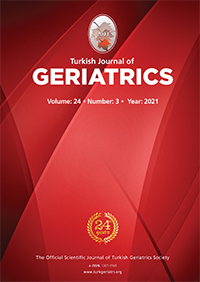2Health Sciences University,Mehmet Akif Ersoy Education and Research Hospital, Anesthesia and Reanimation Clinic, Ä°stanbul, Turkey DOI : 10.31086/tjgeri.2021.232 Background: Myocardial injury after noncardiac surgery is an independent predictor of mortality in the postoperative period, and the risk is higher in geriatric patients than it is for other groups. However, this condition is thought to be underdiagnosed. To obtain a diagnosis, measuring high-sensitivity cardiac troponin is critical during postoperative monitoring. This study aimed to evaluate the presence of myocardial injury after noncardiac surgery occurring in geriatric patients during the perioperative period.
Methods: This study included 259 patients over 65 years of age. A peak high-sensitivity cardiac troponin value of ? 0.03 ng/mL was accepted as a diagnostic criterion for myocardial injury after noncardiac surgery. The patients were divided into two groups?those who were diagnosed with myocardial injury after noncardiac surgery (Group A) and those who were not (Group B). Incidence rates, 30-day mortality rates, hospital stay durations, levels of urgency, and comorbidities were compared between the two groups.
Results: The mortality rate in Group A (25%) was significantly higher than that in Group B (5.8%; p < 0.001). In addition, the hospital stay duration was significantly longer in Group A. Finally, the rates of diabetes, coronary artery disease, and chronic renal failure were significantly higher in Group A.
Conclusions: The results of our study indicated that the mortality rate and hospital stay duration were significantly higher in geriatric patients with myocardial injury after noncardiac surgery. We think that high-sensitivity cardiac troponin values should be routinely monitored in the postoperative period in patients over 65 years of age for timely treatment of myocardial injury.
Keywords : Postoperative Complications; Troponin; Mortality; Geriatrics
